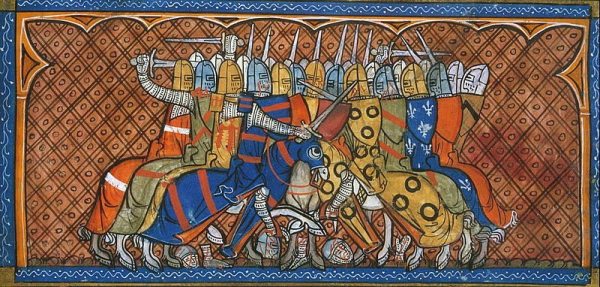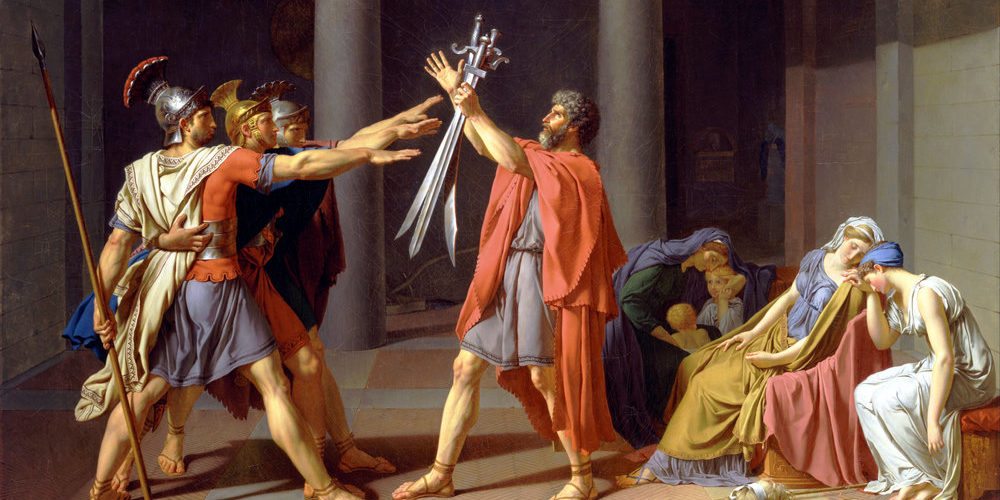
(public domain)
A couple of weeks ago, I interviewed author, historian, and all around awesome dude Myke Cole about the disconnect between the misunderstood realities of historical diversity and the long-standing, and only relatively recently addressed, dearth thereof in speculative fiction.
Professor E.H. Kern had some additional thoughts to share on the subject and kindly agreed to an email interview. She is an adjunct instructor at the Department of History at Florida International University and holds a Ph.D. in history from University of Gotheburg, Sweden. She’s a freelancer for Book Riot and for Quirk Books where she writes the feature Quirky History. When not teaching, reading, or writing about all things historical, she enjoys spending free time in Florida’s wetland nature reserves, silently thanking the alligators for not turning her into a snack.
GM: Professor Kern, where do the roots of the common misconceptions about historical diversity come from? When did they become widespread?
EHK: It’s rooted in a rewriting of history that started in the middle of the eighteenth century. At the center of this change are the European empires that controlled much the world between 1750 and 1960, particularly the British Empire. When the British Empire was at its height, it controlled a quarter of all land on Earth. And throughout this empire, as well as in Great Britain itself, the British developed certain ideas about race. They divided people into a racial hierarchy based on how much of a fight they put up against the British taking over their land. And, of course, at the top of this racial hierarchy they placed the white race, in particular the British white race with its historical roots in a rewritten, white-washed Middle Ages. When we talk about history, we often overlook the existence of the British Empire, but in many ways we are still affected by that worldview.

GM: Any indication of when spec-fic/fantasy writers began to accept and use the myths? Any thoughts on why?
EHK: Speculative fiction goes back a long way. I mean, you could argue that Johannes Kelper and Margaret Cavendish are two of the very first authors of speculative fiction. But when it comes to modern speculative fiction, in particular fantasy, I’d say that J.R.R. Tolkien is the fountainhead. There is a before and an after Tolkien. And Tolkien was a man very much of his time. He was born in South Africa, which at the time was a colony in the British Empire and with much of the racist society structure that later would become Apartheid already in place. He was educated in the British School system during the height of the Empire. He then went on to become a professor of philology, which is the history of languages. And when it comes to racially charged theories affecting academic research, philology is right there at the epicenter. So, here we have a white, British man, born in a colony of the British Empire, who the goes on to become a professor of philology. And this worldview of Tolkien’s comes through in his writings. And since Tolkien is such a monumental figure within fantasy fiction, his worldview has spread throughout the genre and has generated tropes. So here too, the British Empire affects us. And we need to be aware of that so we can start moving away from the most problematic aspects of Tolkien’s legacy, get rid of those tropes. Because there is no doubt Tolkien is a monumental story-teller, and his place as the founder of modern fantasy literature is well-deserved.
GM: What are some fiction and/or non-fiction works we can dig up for perusal?
EHK: When it comes to fiction, I’d say Wesley Chu and N.K. Jemisin. Chu’s Tao trilogy is really interesting because he combines science fiction with alternate history, and he’s done a great job with that. There is so much to pick apart in those novels from the point of view of an historian. Like, how human agency affects the development of history, or the use of history to tell a story, or how certain turning points in history can be explained. Really good stuff. N.K. Jemisin, because, especially in The Broken Earth, she creates her own primary sources for the world where the stories take place. And in doing that, she manages to provide commentary on our society and our time that is very sharp and to the point. Historians that I can recommend are Helen Young, who has written and edited books specifically on race and racism in speculative fiction. Jonathan Hsy (ed note: who happens, apparently, to teach at Shiri’s alma mater), who has written about the fact that people in the Middle Ages needed to be able to speak several languages and navigate culture clashes just to get through their everyday lives. Also Jonathan is working right now on a book about medieval authors who were deaf and blind. Here I would also like to mention Henry Louis Gates Jr. and David Bindman who have editing an updated edition of The Image of the Black in Western Art, which is a true treasure trove.

GM: Fiction writers make stuff up—it’s kind of our thing. Where does creative license expire? Are there areas of history which are okay to play with and some which aren’t? Where are the lines?
EHK: This is the question comedians ask as, “Can you joke about everything?” My immediate response would be that it’s possible to write about anything in history with creative license. It all depends on how it’s done. Then, of course there are historical fiction scenarios that will never be okay, like the romances between Jewish concentration camp prisoners and the Nazi officers who hold them captive. That will always be a no to me.
GM: How do we shake people out of their decades-long, “Well, that’s the way it was back then,” complacency?
EHK: The problem is that information tends to stick around for a long time even after it has been debunked. No one today would say that they believe in the theory of the four humors, and still we perpetuate ideas about aggressive men and melancholic women. It’s a slow process, changing peoples’ minds. It can be a slog. But we need to keep at it. Keep bringing forward new knowledge and sooner or later, that too will stick.
GM: What advice to you have for other writers who want to jump into the fray?
EHK: Keep an eye on the latest historical research. There’s so much interesting stuff going on and much of it is easily available online, and for free. Sites like The Public Medievalist, which right now has a series running called “Race, Racism, and the Middle Ages” which is excellent. Or Medievalists.net, which publishes summaries of the latest medieval research as well as links to the original research article if you want to delve deeper. Then there’s medievalpoc, who focus more on art history, and run a great Twitter account and Tumblr (ed note: Shiri would also like to add Ancient Warfare and Medieval Warfare, both published in English every other month by Karwanasaray out of Netherlands and which are both about far more than warfare alone).

GM: Are there any specific pitfalls you’d urge other writers to avoid?
EHK: Check the credentials of your sources and authors. Just because a website has the word “history” in its title or URL doesn’t mean that they know what they’re talking about. Same goes with people. There are people who call themselves historians without actually being an historian. Being an historian is a profession. Anyone can read a primary source, what matters is how you read it and what you do with the information you find (ed note: emphasis added). And that requires training. If you do research online, domains like “.edu” and “.gov” are generally trustworthy. If you look at books, check the publisher. Who published the book? What is their reputation? What other authors do they publish? Do they normally publish history? If you are starting out in that field and you feel very uncertain, I’d recommend that you initially stick to books published by university presses or imprints well-known to publish history for the public. The more familiar you become with the state of the art in the field you’re delving in to, the more confident you will be in finding the right material for you.
GM: Talk about the ways in which you’re using social media.
EHK: I’m pretty active on Twitter. I don’t have a specific topic that I address in my tweets but I tend to start threads on topics relating to history that get me going. The other day it was about how history is the one discipline that is the most used and abused for political purposes, for example (@EH_Kern).
GM: What color is your saber?
EHK: Since I’m a Stargate fan, I’m more likely to wield a staff weapon than a saber. Until the Jaffa I stole it from catch-up with me, that is, and I’m turned into a Goa’uld host.




